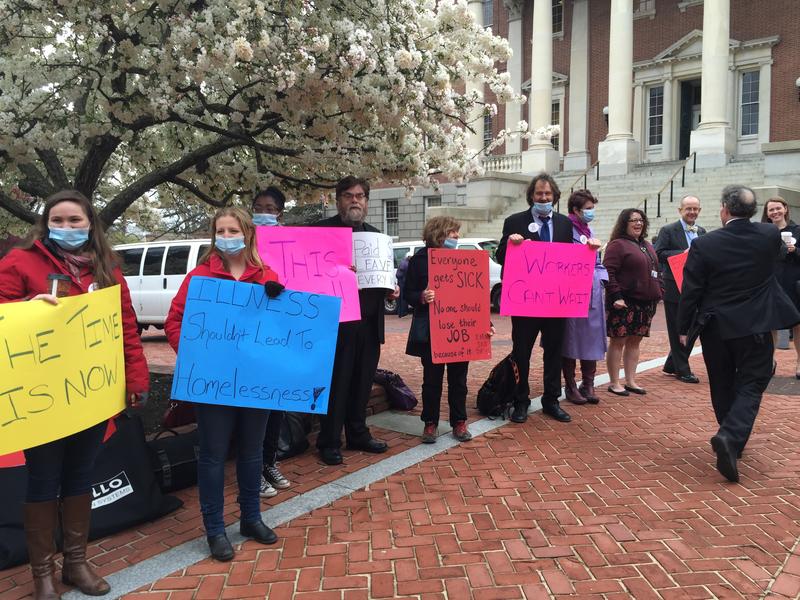Click here for the DLLR Paid Leave Poster
Feb 10, 2018 – Maryland Paid Leave Law Effective Sunday Feb 12 – HM
Feb 2, 2018 – Delay Of Paid Sick Leave Law Advances In The Senate – DR
Feb 1, 2018 – Regulators And Businesses Scramble Over New Paid Sick Leave Law – Cap
The General Assembly has voted to override the Governor’s veto. Jan 12, 2018 – Maryland Paid Sick Leave Becomes Law – Sun
Dec 15, 2017 – How To Give Maryland Workers Sick Leave Without Killing Businesses – Post
Dec 11, 2017 – Delegate Dr Morhaim Floats Delay In Paid Sick Leave Veto Override – DR
Dec 1, 2017 – There Is Room For Compromise On Paid Sick Leave – Cap
Nov 28, 2017 – Hogan Unveils New Paid Sick-Leave Measure In Hopes Of Avoiding Veto Override – Post
The veto fight over Maryland Paid Sick Leave is heating up with a couple new defections and the Governor’s announcement of a new compromise bill with the promise of over $100 million of new tax credits for Maryland businesses. Maryland Paid Sick Leave will be one of the first items debated in the 2018 General Assembly Session beginning January 10, 2018 at Noon.
- Background: Many versions of the bill failed in the General Assembly over the passed five years, but in December of 2016, Governor Hogan introduced a statewide measure to expand paid leave. It was a bipartisan, balanced compromise that had the potential to cover 100 percent of Maryland workers, without overburdening Maryland’s small businesses and killing jobs.Unfortunately, members of the legislature ignored the Governor’s bill and instead supported House Bill 1 (HB1), which is similar to the previous failed bills and is confusing, unwieldy, and a deeply flawed bill that would harm small businesses and jeopardize thousands of Maryland jobs.Therefore in May the Governor vetoed the bill and took immediate action, signing three executive orders to help address the important issue of Maryland paid leave. The first executive order provided paid leave benefits equal to the benefits in Governor Hogan’s bill to all of the state’s contractual employees in the executive branch, in an effort to lead by example. The second executive order authorized all Maryland procurement authorities to begin giving a preference to contractors who offer paid leave to their employees.
Finally, the third executive order established the Committee on Paid Leave Policy. Governor Hogan tasked Labor Secretary Kelly Schulz to lead this task force to conduct a comprehensive, collaborative field study to determine the realities of paid leave for employers and employees across the state.
The Committee on Paid Leave Policy spent six months conducting in-person interviews with impacted organizations, individuals, employees, and employers from one end of the state to the other. The findings of the report ultimately reveal that the legislature’s bill contains major flaws and unintended consequences. HB1 contains numerous onerous provisions and mandated procedures that are so complicated that even the smallest mom-and-pop shops would need an HR director to navigate them, and business owners trying to do the right thing risk inadvertently incurring extreme putative damages. A particularly outrageous, intrusive requirement of the legislature’s proposal could force workers to offer proof to their boss, including information about sensitive health issues and private, personal matters, in order to access their sick leave.
- Governor’s New Compromise Offer: Governor Hogan announced at the end of November that he will introduce emergency legislation, the Paid Leave Compromise Act of 2018, that will be ready on the first day of the upcoming legislative session. This compromise proposal will require businesses with 25 or more employees to offer paid leave by 2020 – these paid leave benefits will be phased-in, to give Maryland’s small business job creators time to prepare, a similar approach has been taken in other states like Rhode Island.The governor’s compromise proposal also includes language originally introduced by Democratic Senator Bobby Zirkin which allows qualifying businesses that can demonstrate a significant financial hardship to be exempted from having to provide paid leave benefits by applying for a hardship waiver from the Department of Labor. Moreover, the Paid Leave Compromise Act of 2018 provides Marylanders with paid time off – no questions asked – and strips the costly punitive enforcement regulations from the legislature’s flawed bill.
- Small Business Relief Tax Credit: As part of the governor’s plan to expand paid leave, he announced that a second bill, the Small Business Relief Tax Credit designed incentivize our small businesses to offer this benefit, rather than mandating it at the risk of unfairly punishing our job creators.
Because the legislature’s bill does not cover the thousands of people who are employed by smaller businesses, the Small Business Relief Tax Credit will provide $100 million in tax credits to small businesses that choose to provide paid leave benefits.
Hopefully with the Governor overture and offer of tax credits the leadership of the General Assembly will be willing to work on a compromise bill instead of ramming the flawed HB1 through on a party line vote. This issue is too important, and the impact is too far-reaching to risk getting it wrong.













